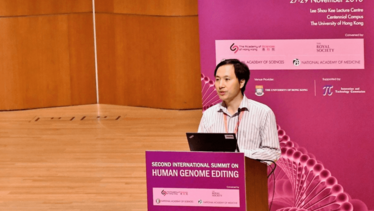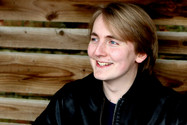
Moving on from the Great CRISPR Controversy
How will the storm whipped up by He Juinkai’s flagrant disregard for medical ethics affect the wider ambitions of the gene-editing field?
When He Juinkai announced to a stunned audience in Hong Kong in late 2018 that he had created the world’s first gene-edited babies using CRISPR/Cas9, it shook the scientific world to its core.
“There are still fundamental issues with the safety and efficacy of CRISPR/Cas9 that have not been worked out,” says Richard Sherwood, Assistant Professor of Medicine at Harvard Medical School. “It’s an extremely irresponsible thing to have done.”
Such a belief is understandably widespread. Indeed, concerns about the safety of the technology, as well as its potential misuse, have demanded a cautious approach in most scientific circles. Caution evidently not shared by all scientists.
Challenges at the cutting edge
CRISPR is just one branch of cutting-edge science that can be abused. Douglas Sipp, a researcher at the RIKEN Centre for Developmental Biology in Japan, says, “I’ve been studying stem cell tourism for several years, and the more I look at it, the more I see it as serious crime.” In 2017, Sipp joined a group of leading stem-cell experts who demanded a call to action against the problem of unproved stem cell-based interventions for sale in large Chinese clinics. Such clinics often charge tens of thousands of dollars for unproven treatments, and appear to bypass regulations introduced by the Chinese government in 2009. “These are well-organized criminal organizations that target sick people and their families,” says Sipp.
But China isn’t alone when it comes to unproven stem cell treatments – the modern-day equivalent of “snake oil,” according to Daniel Weiss, Chief Scientific Officer at the International Society for Cellular Therapy (ISCT). Weiss exposed the “dark side” of cell therapy in The Medicine Maker in September 2017 (1), stating: “Unfortunately, unscrupulous people are bold enough to take advantage of desperate patients, and there are countless clinics worldwide advertising cell therapies to treat a range of diseases including cancer, Alzheimer’s, Parkinson’s and more.” Recognition of the problem came from the USA in August 2017, when the FDA set out new policies and enforcement efforts to tackle the serious – and sometimes tragic – implications of such clinics (2).
Dispersing dark clouds for clear ambition
At a meeting of the Chinese Academy of Science and Engineering in May 2018, China’s Premier, Xi Jinping, reaffirmed his country's commitment to becoming the world’s technological powerhouse. “Self-determination and innovation is the unavoidable path if we are to climb to the world’s top as a leading player in technology,” he said. Jonathan Moreno, a Professor of Medical Ethics at the University of Pennsylvania, notes the forward trajectory: “There is a clear intention in China to bring back talent from the outside and really push China as a hub for technology.”
Just how much of a dark cloud will ongoing issues in the stem-cell arena and He’s public admission of ethical rule breaking cast over China’s wider scientific ambitions?
Wolfgang Hennig is an expert on Chinese medical ethics, and has written extensively about their development over the past 30 years. He is critical about the Chinese government’s efforts when it comes to rule breaking. “The government only acts if these things become public,” he says. “If it’s shown that someone is acting out against the paradigm then the government will take steps, but there is no active, permanent control to assume that regulation are upheld.”
In a European Molecular Biology Organization (EMBO) report published in 2006 (3), Hennig and colleagues concluded, “Chinese regulations and guidelines do not substantially differ from those in Europe but their implementation in daily research and clinical practice is not comparable with Western standards.” Henning is not convinced much has changed in the intervening decade: “It’s been that way since the beginning and I think the situation is the same today.”
State responsibility versus personal accountability
Clearly, regulations – and their enforcement – have an important role to play across the globe. But was He simply a rogue agent who threw away the rulebook? The Associated Press reported that He may have deliberately misled both the participants of his trial and China’s regulatory bodies (4). And He’s employer was certainly quick to publically distance itself from his activities. Shortly after the summit in Hong Kong, China’s Southern University of Science and Technology issued a strongly worded statement condemning He’s work: “The research was conducted outside of the campus and was not reported to the University nor the department […] and has seriously violated academic ethics and codes of conduct.”
Whatever the regulations – and however strict their enforcement – Moreno believes that individuals are ultimately accountable: “Standards for the conduct of science are established on the expectation that people who want to function within the consensus-based scientific community will pay attention to them,” he says. “Just about everything that Dr. He and his colleagues did goes against the regulations and standards established by organizations in the US and UK.”
But Moreno does wonder about reactions out of the spotlight. “How do the authorities in China view [the CRISPR] incident? As an expression of resolve to advance their biotechnology effort or as an embarrassment that calls for fresh resolve to play by internationally established conventions?”

He Jiankui presents his controversial work at the 2nd International Genome Editing Summit in Hong Kong, November 27, 2018.
According to reports, He is currently under house arrest with restricted access to the media, which gives us some clue about China’s view on the matter. On January 21, 2019, authorities in Guangzhou Province (where He is located) announced the results of their preliminary investigations, stating that He and other relevant personnel and organizations would receive punishment according to laws and regulations (5). Time will tell, and Moreno believes the key outcome in the aftermath of this episode will be what sanctions – if any – will be applied to He and his collaborators in China. If the repercussions are minimal, how many equally ambitious/unscrupulous scientists will be inspired rather than appalled by He’s bold actions?
“What happens to Dr. He and others sends a clear signal,” says Moreno.
Global response
Though the reaction from the international community has been one of overwhelming condemnation, where does it leave the field as a whole? Shortly after He announced his work at the 2nd International Genome Editing Summit in Hong Kong, CRISPR co-inventor Jennifer Doudna and Harvard Medical Researcher George Dalay (one of the meeting’s organizers) told Science magazine that they wanted to see the establishment of an international body with powers to decree what is permissible. Such a body would provide an ethical framework for scientists to follow. Sherwood agrees: “This case makes clear that the international community must come together to devise a set of rules to govern what the burden of proof would be to warrant a sanctioned test of germline gene editing.”
Will all scientists play ball when it comes to such conventions? Or will individual – or national – aspirations to lead the “science race” clash with any restrictive set of rules to emerge from future summits?
- D Weiss, “Putting a Stop to Cell Therapy ‘Snake Oil’”, The Medicine Maker (2017). Available at: bit.ly/2Bxl3Uf. Accessed February 11, 2019.
- U.S. Food and Drug Administration, “Statement from FDA Commissioner Scott Gottlieb, M.D. on the FDA’s new policy steps and enforcement efforts to ensure proper oversight of stem cell therapies and regenerative medicine,” (2017) Available at: bit.ly/2vwJE6E. Accessed February 11, 2019.
- W Hennig, “Bioethics in China: Although national guidelines are in place, their implementation remains difficult,” EMBO Reports, 7:9, 850-854 (2006). PMID:16953195.
- C Larson, AP News, “Gene-editing Chinese scientist kept much of his work secret,” (2018) Available at: bit.ly/2Sr4qEf. Accessed February 11, 2019.
- XinhuaNet, “Guangdong releases preliminary investigation result of gene-edited babies,” (2019). Available at: bit.ly/2UW8MQD. Accessed February 11, 2019.
















